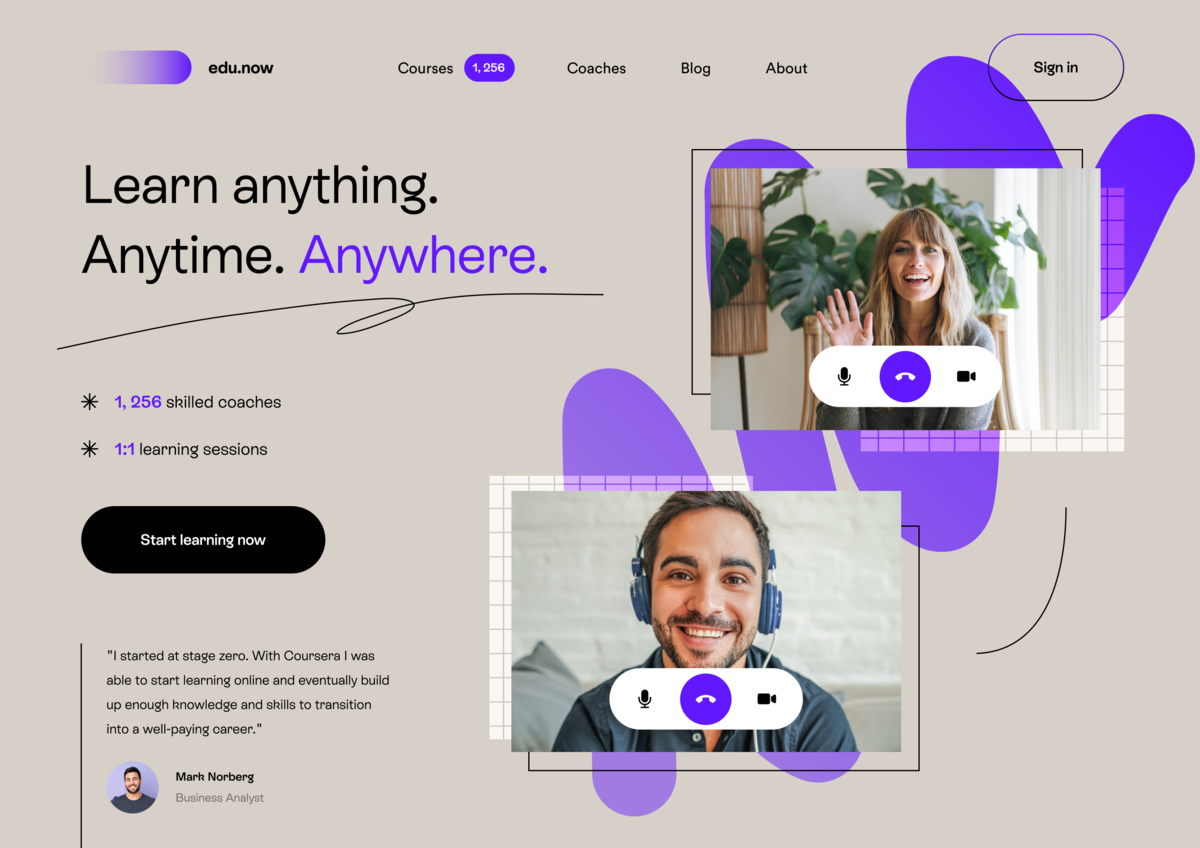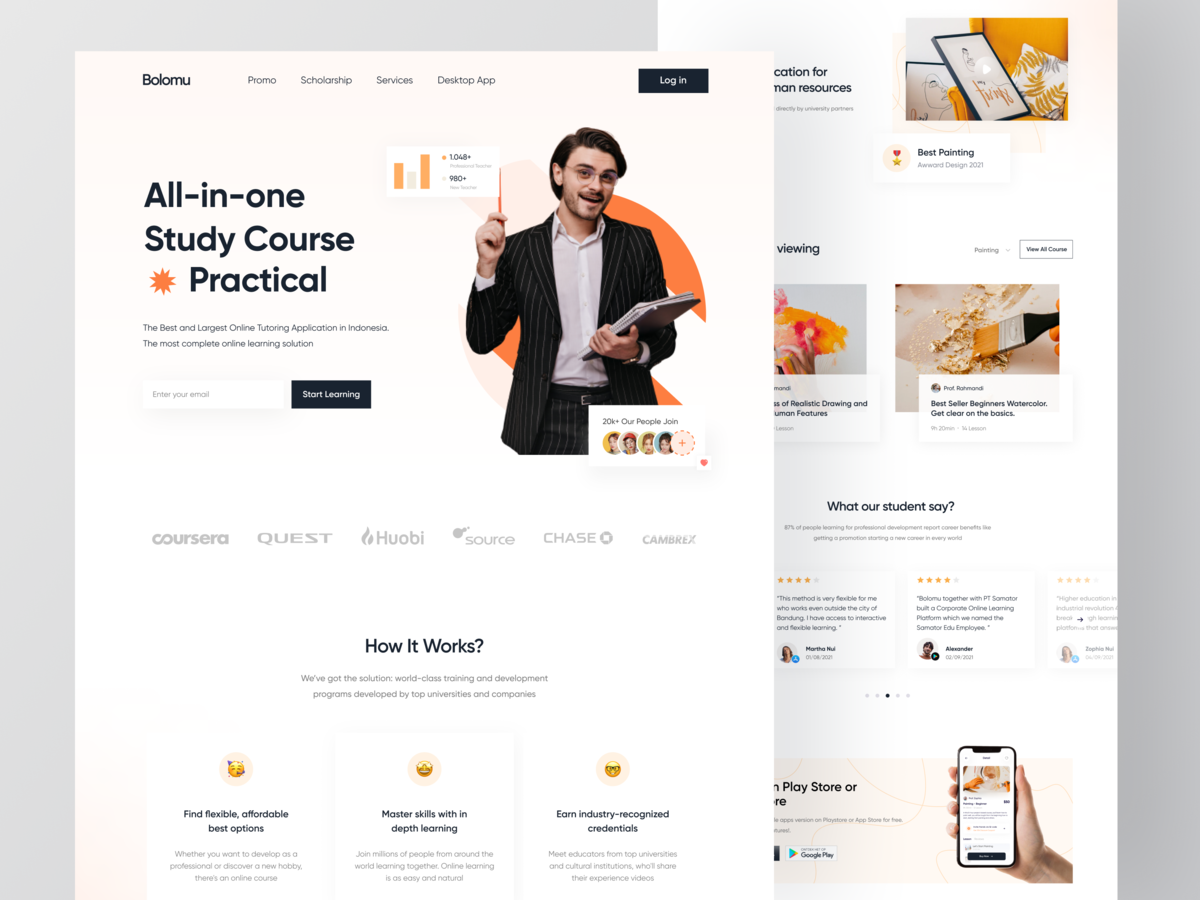Have you always wanted to create online courses? Perhaps you have something unique to tell the world or valuable experience to share? There is no better time than now. If not knowing how to make an online course is the only thing standing in your way, then the internet has brought you to the right place.
We will go over the process from start to finish, give you some tips and ideas on how to prepare for online course development, how to decide on your course platform and format, who can help you bring it all to life, and so much more. Without further ado, let’s learn how to create an online course.
How to choose a topic for your online course
If you have already chosen your online course subject, you can just jump to the next section because you are amazing.
If you haven’t — that’s absolutely fine. It may turn out to be even more beneficial for you. Here, we will offer some tips and techniques for finding a topic that can motivate you to create a successful online course.
As odd as it may sound, people tend to overlook, underappreciate, or fail to recognize their talents. It’s like forgetting your own name when introducing yourself. However, there is no need to rush into it. Take some time to reflect on your experiences, which soft or hard skills you have acquired from them, how they can be useful for others, and whether you are genuinely passionate about what it is you are good at.
Your talents may not seem that obvious or even good enough to you, which means that you might need some input from others. Ask your family, friends, or colleagues what they think you are competent or talented in before starting to think about how to create an online course. Then, you can write them down or make a table and analyze what you have. Check if there are any similar online courses and whether they are in high-demand and valuable at the moment. Ask yourself the following questions:
- Does this actually mean something to me?
- Is it valuable for others?
- Which personal or professional experience allows me to think of myself as an expert?
- Does it feel comfortable and enjoyable to teach this topic?
- Do I have something important to tell the world?
- Can my experience teach something unique?
- Can I help someone solve a problem?
Once you have all of this straightened out in your head, it will be a lot more manageable for you to choose your online course topic, figure out how to create an online course, and understand why you are doing this. This way, all the subsequent steps will cause you a lot less doubt and self-loathing, keep you engaged and motivated, and help you constantly increase your future business performance!
How to get ready to develop an online course
Attending online courses does not demand your physical presence and can be more convenient and a little less exhausting. Still, it may not be enough to persuade potential clients to spend a considerable amount of time working to develop a new skill, changing their life perspective, and also paying you for all that.
How can you ensure that your idea will be successful before you start putting more effort into it? Two words: background research. Before starting to create online courses, make sure that you know enough about your target audience, competitors, market, and demand.
Try to put yourself in your audience’s shoes to understand how to create an online course specifically for them. What are their pain points, what do they like, what don’t they like, or what could they potentially like? You need all the information you can get to customize and optimize your product. Run some polls, monitor social media statistics and search trends, create questionnaires, and conduct potential customer interviews. Then, systematize everything you have to analyze your target audience and set your goals.
Find out more on how to collect customer data!
Similar tactics apply to studying your target market. Pay attention to current trends, monitor statistics and market research reports, and figure out whether choosing this particular market can actually be profitable. Maybe you need to follow a different trend or decide on a different market. This strategy will allow you to find out if potential clients are ready to pay and whether there is a point to promote online courses to them. Consider using tools like MarketResearch to monitor statistics, analytics, and research reports on various markets.
 Discover the latest insights on your market using MarketResearch
Discover the latest insights on your market using MarketResearch
Knowing your competitors, what they do, and what they can do will allow you to shape your expectations. To make courses that are rewarding, you need to have some examples of successful courses to determine whether you can fill a gap in the competition. Analyze their products, how valuable they are to their clients, their prices and possible profits, and marketing strategies for online courses.
Since your target audiences are similar, monitoring and evaluating your competitors’ social media activity will enable you to gain some insight into what kinds of content your potential customers like. For example, you can implement an analytics tool like Popsters to monitor your business opponents’ popular hashtags, likes, comments, shares, engagement rates, and more.
 Analyze your competitors’ social media activity and performance with Popsters
Analyze your competitors’ social media activity and performance with Popsters
There are lots of various types of online course formats that can be beneficial for you and your audience. You just need to decide which one works best in your case. However, it should not be difficult once you have researched your audience and competitors, chosen a course topic, and analyzed your target market.
Live webinars
Live webinars are a great option if your audience has enough free time or a flexible schedule since they will have to attend your courses at fixed hours. Although this way to make courses enables you to actively interact with your audience, you should still include an option to watch the recording later. Live webinars are the best option if your experts are charismatic, have a sense of humor, and are great public speakers. You can also conduct a live webinar to promote and give a sneak peek of your bigger online course.
Take a closer look at some of the best webinar platforms to try!
Recorded webinars
Not everyone is hardwired to sit through a two-hour live webinar without taking a break and being focused at all times. Recorded webinars are an excellent method for creating online courses to avoid possible technical issues that can occur during a live webinar. However, remember to steer clear of filming long videos with never-ending introductions. Instead, keep your videos concise and well-structured. Captivating storytelling and aesthetic visuals should be on your side here.
Audio-based online courses
The audio format is a great way to make courses if your audience is constantly busy, for example, if they are full-time working parents. Remember that you need to put some extra effort into providing immaculate sound quality and choose a speaker with excellent pronunciation skills. However, this format is not a great fit for an online course where its success depends on visuals, like photography or graphic design courses.
Text-based online courses
If you’re wondering how to create an online course if your potential clients are not great visual or auditory learners, text-based courses are an excellent option. Alternatively, you can include text guides, useful materials, and checklists as a bonus to your main video course program. Either way, your text materials should be straightforward, engaging, and well-structured. You can get creative with fonts, page setup, lists, and more to ensure that it does not look like the work of an information hoarder.
Long story short, it all depends on your needs, preferences, and budget. At least, that is a conclusion you might draw from this section. Let’s dive a little deeper into how to choose an online course platform that works for you.
Identify what you need
If you have thought about your online course topic, format, and strategy long and hard, listing your exact software requirements should not be too difficult. And by “listing” them, we mean actually making a list, not just taking mental notes. Whether it is a free trial period, compatibility with other platforms and services, white-labeling, gamification, secure payment gateways — write it all down. You will be able to come to a sound decision and make courses without having to compromise your success.
Define your budget and desirable software price
Price is a crucial factor you should pay attention to when choosing an online course platform. A great idea here would be to do the calculations to determine how much you are willing to and can pay. You should have a clear picture of a desirable price and whether or how much more you are ready to pay if necessary. This tactic will allow you to narrow down your search, speed up the process, and save you some time.
Ask your potential customers
Once you put more leads and prospects into your sales narrative, the way to explore what they like is to simply ask them. There is a high chance that it is not their first time purchasing an online course, meaning that your leads can share their feedback on some platforms they have had experience with. For sure, you cannot go with software that is not a good fit for your course simply because customers like it. However, these responses could help you decide if you are stuck in the middle of two similar platforms and figure out how to create an online course based on your audience’s specific needs and preferences.
Learn how to encourage honest feedback, recommendations, and healthy criticism from your customers.
Test and think it over
Many online course platforms offer a free trial period, allowing you to try them out for yourself. Use this chance to see them in action and gain some insight about the future customer experience they can provide. Take out your list of desirable features, and analyze if a platform checks all the boxes. Don’t forget to compare them to explore which one offers a more affordable price, more suitable features, better usability, etc.
Check out some of the best online course platform examples!
But don’t overthink it
It is a tough line to walk — we get it. Although the devil is in the details, and you need to have all of these tiny things figured out to create online courses, try not to get too carried away. Your primary focus should still be on your content and your clients. Even if you choose the most excellent software, will people still want to buy your course if the content is second-rate and sleazy? Not in this life. In any case, regardless of how many burdening tasks you have on your list, you don’t have to do all of them alone.
How to gather your team to create online courses
Depending on your skillset, there are tasks that you can do all by yourself. However, even if you are capable of completing them all, we don’t recommend you to do that. Hats off for having a wide range of skills, of course, but you are just going to be burned out and overwhelmed before your online course even launches. A smarter thing to do here is to delegate your tasks. Let’s see what kind of professionals you might need to create online courses.
Industry experts
Including someone apart from yourself as a speaker is a great way to diversify your course. This tactic enables you to share different experiences, approaches, and personal stories to put a spin on an old topic and make it more complex.
Still, you should be absolutely confident in your speakers and their professional competence. Needless to say, you cannot just hire an expert without checking if they are actually an expert. Check your potential speakers’ certificates, diplomas, references, recommendations, and social media profiles before you even think of cooperating with them.
Visuals team
We were all taught not to judge a book by its cover, but no one said you cannot have both quality content and appealing visuals. Designers, video editors, camerapeople, and other visual experts will help you present your online course and make it more attractive to the audience. Even if it is your first-ever course, it should not be an excuse to phone it in with your landing pages, ad and website layouts, and video quality.
Sales team
Your online course, however excellent and unique, will not promote and sell itself. Your sales team, of all people, should know that. They will be there when your successful course starts gaining new students and strive to bring you even more clients. You can help them close more deals by incorporating chatbots into their daily work routine. This way, customers will still be able to contact your salespeople when they really need to, and chatbots will handle all the heavy lifting.
Discover how you can automate your sales process!
Tech support team
These people know how to make an online course while avoiding all the possible technical issues. Hiring a team of tech experts will allow you to make sure that your new course video will definitely be posted, an email to a client will be delivered, and students will not be left to deal with possible problems on their own. You can sleep tight knowing that your clients are provided with a premium experience even if you are not there.
How to produce your online course content
Finally, the creative part! By now you should have chosen your online course topic, done some background research, chosen your online course format and platform, and hired a team of professionals to help you. Let’s talk a bit more about how to bring it all into action and start creating your content.
Audio and video content
In other words, your online course itself. First things first, you need to ensure excellent quality of your material and outstanding time management. If you are filming a webinar or going live, you need to find a room or background with good lighting and acoustics. Give yourself some extra time in case something goes wrong. If you are recording an audio course, it would be a great idea to do this in a studio with proper equipment, meaning that you might want to invest a bit more to provide the best quality.
Landing pages
Developing a responsive and well-designed landing page should be another task on your to-do list. It requires planning, analyzing your audience, and some serious effort. However, an effective landing page can help you gain more clients and succeed in promoting online courses. Here is an example of an online course landing page to give you an idea of where to start:
 Landing pages are one of the best marketing strategies for online courses to bring more clients; source: Dribble
Landing pages are one of the best marketing strategies for online courses to bring more clients; source: Dribble
Creating landing pages can be challenging sometimes, but with landing page builders, it doesn’t have to be. You can develop your landing page in 15 minutes and start to promote online courses to be sure that they reach your audience.
Dive deeper into the anatomy of a good landing page and grab some tips on laying out your page’s copy and design.
Social media ads
Once again, your courses will not advertise themselves. Unsurprisingly, social media comes in handy in this case. Networks like Instagram and Facebook are excellent for promoting online courses with their targeted ads. Take a look at an example of how your online course social media ad could look:
 Implementing social media ads can be an effective online course marketing strategy
Implementing social media ads can be an effective online course marketing strategy
This targeted ad on Instagram Stories allows you to swipe up and register for a course right away. You can implement this online course marketing strategy to reach a wider audience and increase the number of applicants for your course.
Want to know more about how to use Instagram for sales? Check out our post!
Website
If you decide to develop your own website instead of posting your online course on a ready-made platform, remember to ensure that your design has no disparities with your landing page and ads.
Building a custom platform for your course enables you to provide students with adaptable website architecture and let their learning run seamlessly. Maintaining consistency while developing your UI to improve your platform’s usability is also a great idea. Here is an example of an online course website that can inspire you to build your own:
 Developing your own online course platform enables you to customize it; source: Dribble
Developing your own online course platform enables you to customize it; source: Dribble
Coming back to our point about promoting online courses on social media, starting your own profile could significantly increase your number of leads. Start your promotional campaign on YouTube, incorporate Instagram and Facebook targeted ads, create a community on Reddit, and let people explore more about who you are and why you are qualified enough to teach.
Learn more about how to develop and manage your online reputation!
Other marketing strategies for online courses include:
- creating a live webinar;
- developing a mini-course;
- promoting your course as a podcast guest;
- guest blogging;
- using Google ads;
- offering discounts.
The key to a thriving online course marketing strategy is consistency. It’s always consistency, isn’t it? The more your audience knows about you and the more humanized your brand is, the more they will trust you.
How to get ready to launch an online course
Now we need one last check before your online course launches to make sure it all goes according to the plan. At this stage, you still have a chance to slightly change, improve, or correct something. Buckle up — it’s beta-testing time.
What’s in it for you? Beta testing allows you to gain some testimonials and case study materials, avoid troubleshooting and increase your profit margin during the future launch, understand your audience better, and collect precious feedback.
Check out some points to remember when starting to beta test your online course.
Stick to your primary goals
Take some time to sit back and decide how many beta testers you will need, what your desired outcomes are, how you will analyze testers’ feedback, etc. This way, you won’t get off track and can gain a better understanding of how to make an online course that reflects your values and aims.
Don’t overburden yourself when choosing beta testers
You don’t need to recruit experts as your beta users since their level of knowledge should correspond with your potential clients’ skills and competence. Reach out to the audience that’s already interested in your products — your leads and prospects.
Keep it brief
Remember that it’s a test version, not a finished course. Compile a short outline of your content to keep your timeline brief. However, depending on how your beta testing process goes, you may need to expand or shorten it.
Don’t expect perfection
It is not supposed to be perfect, and you should emphasize that to your testers. Moreover, you don’t have to present a finished course, so don’t go out of your way to polish everything to perfection.
Gather as much feedback as possible
Your key goal here should be collecting and evaluating feedback. Single out some vital points on what needs to be improved and what went smoothly. This technique will provide you with insight that can help you come up with personalized tips on how to make an online course.
Decide how to price your test course
Should you make your beta-version free or paid? This decision depends entirely on your course, audience, and goals. However, selling your test course even at a discount will prove that people are ready to pay for the value it provides.
Make changes
Once you have gained all the information you needed along the way, start enhancing your course. You can fine-tune your online course marketing strategy, adjust your content, and start developing onboarding campaigns.
How to launch your online course
After releasing a beta-version, analyzing your results, and polishing your course, you are finally ready for your big launch! Let’s take a look at some final steps you need to complete to create online courses.
It’s a perfect time to put a spotlight on those testimonials and positive user reviews. Your landing pages, website, and social media ads will step up, so make sure that your CTA buttons are clickable, your checkout works immaculately, and your thank you page is as welcoming as ever.
So what do you do after your course launches? You keep it up! Be there for your students 24/7, continue collecting feedback, and keep improving your online course. Let students know that their experience remains as crucial to you as before, and don’t take their love and trust for granted.
Ready? Set? Go!
As exciting and rewarding as it is, teaching the world something new and creating online courses can be a burdensome and life-draining process. Feeling nervous and antsy about it is perfectly understandable. Still, these emotions should not stop you from creating something new and value-driven.
On our end, we can help you automate and speed up the process to enable you to focus on more creative tasks. With SendPulse, you can create chatbots to close more deals, develop landing pages in no time, and launch email campaigns to promote your online courses. Just send us a word when you’re ready.